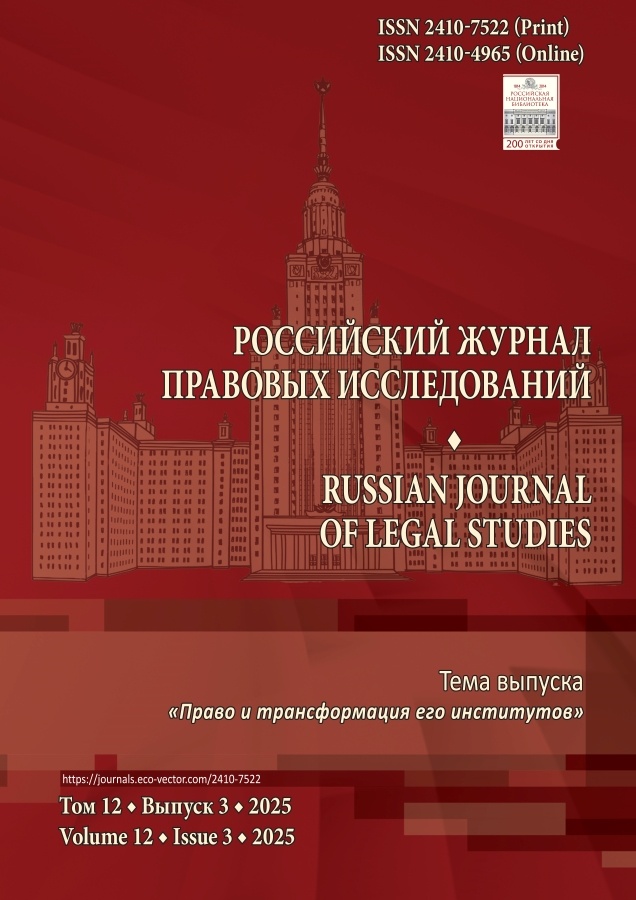Partial invalidation of regulations (based on case law of Supreme Court of the Russian Federation)
- Authors: Burnos E.N.1
-
Affiliations:
- Kuban State University
- Issue: Vol 12, No 3 (2025)
- Pages: 25-33
- Section: Public law
- Submitted: 19.04.2025
- Accepted: 26.07.2025
- Published: 29.09.2025
- URL: https://journals.eco-vector.com/2410-7522/article/view/678729
- DOI: https://doi.org/10.17816/RJLS678729
- EDN: https://elibrary.ru/ROREPJ
- ID: 678729
Cite item
Abstract
The paper delves into the legal challenges brought against regulations before the Supreme Court of the Russian Federation under the Code of Administrative Procedure. The main idea is that, even though the Supreme Court of the Russian Federation is seeing a growing number of applicants submitting file administrative claims, the proportion of those claims that are sustained is remarkably small. This emphasizes that the legal system requires further refinement to provide stronger protection for the rights of individuals and companies. The author highlights several key points to explain the small proportion of sustained claims. Primarily, this is due to procedural and legal barriers encountered when attempting to challenge a regulation. The Supreme Court of the Russian Federation often rejects to consider administrative claims when they do not adhere to the formal provisions of Article 209 of the Code of Administrative Procedure of the Russian Federation. These provisions include a clear indication of the contested parts of the regulation and their inconsistency with regulations of greater legal force. Interestingly, when a regulation is successfully challenged, such cases establish precedents helping refine legislation and law enforcement practices. The paper offers illustrative case laws, demonstrating both successful and unsuccessful attempts to challenge a regulation. Based on the analysis of these case laws, the author proposes recommendations for improving legislation, including the need to expand the explanations in the resolution of the Plenum of the Supreme Court of the Russian Federation on the partial challengeability of a regulation. This would allow claimants to better safeguard their rights by invalidating both specific words or phrases in a regulation and its extension to certain categories of subjects of legal relations. The paper highlights the necessity of enhancing legislation and the relative explanations to dismantle procedural barriers and bolster the protections afforded to rights and freedoms of individuals in Russia.
Full Text
About the authors
Ekaterina N. Burnos
Kuban State University
Author for correspondence.
Email: enburnos@yandex.ru
ORCID iD: 0009-0005-7975-049X
SPIN-code: 1532-9220
Cand. Sci. (Jurisprudence)
Russian Federation, 149, Stavropolskaya st, Krasnodar, 350040References
- Nemtseva VB. Features of judicial decisions in cases of challenging regulatory legal acts. Lex Russica. 2018;(2);105–118. EDN: NSZMDD doi: 10.17803/1729-5920.2018.135.2.105-118
- Shardaeva AS. Problems of consideration and resolution of administrative cases on challenging normative legal acts. Issues of Russian justice. 2020;(6):577–582. EDN: XWGUNJ
- Lipen NS. On improving the legal regulation of challenging regulatory legal acts and acts containing clarifications of legislation and having regulatory properties. Actual Problems of Russian Law. 2024;19(12);25–31. EDN: AWDADT doi: 10.17803/1994-1471.2024.169.12.025-031
- Marchenko MN. Judicial law-making and judicial law. Moscow: Prospekt; 2024. 383 p. (In Russ.)
- Vereshchagin AV. Judicial law-making in Russia: comparative legal aspects. Moscow: Mezhdunarodnye otnosheniya; 2004. 340 p. (In Russ.)
Supplementary files








